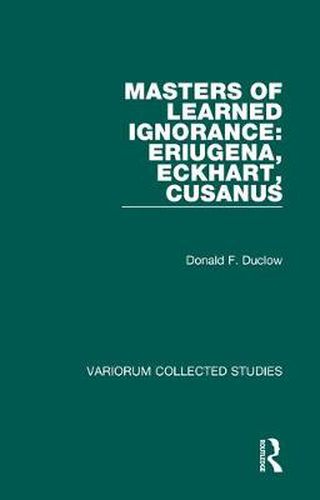Readings Newsletter
Become a Readings Member to make your shopping experience even easier.
Sign in or sign up for free!
You’re not far away from qualifying for FREE standard shipping within Australia
You’ve qualified for FREE standard shipping within Australia
The cart is loading…






The medieval Christian West’s most radical practitioners of a Neoplatonic, negative theology with a mystical focus are John Scottus Eriugena, Meister Eckhart and Nicholas Cusanus. All three mastered what Cusanus described as docta ignorantia: reflecting on their awareness that they could know neither God nor the human mind, they worked out endlessly varied attempts to express what cannot be known. Following Pseudo-Dionysius the Areopagite, they sought to name God with symbolic expressions whose negation leads into mystical theology. For within their Neoplatonic dialectic, negation moves beyond reason and its finite distinctions to intellect, where opposites coincide and a vision of God’s infinite unity becomes possible.
In these papers Duclow views these thinkers’ efforts through the lens of contemporary philosophical hermeneutics. He highlights the interplay of creativity, symbolic expression and language, interpretation and silence as Eriugena, Eckhart and Cusanus comment on the mind’s work in naming God. This work itself becomes mystical theology when negation opens into a silent awareness of God’s presence, from which the Word once again ‘speaks’ within the mind - and renews the process of creating and interpreting symbols. Comparative studies with Gregory of Nyssa, Pseudo-Dionysius, Anselm and Hadewijch suggest the book’s wider implications for medieval philosophy and theology.
$9.00 standard shipping within Australia
FREE standard shipping within Australia for orders over $100.00
Express & International shipping calculated at checkout
The medieval Christian West’s most radical practitioners of a Neoplatonic, negative theology with a mystical focus are John Scottus Eriugena, Meister Eckhart and Nicholas Cusanus. All three mastered what Cusanus described as docta ignorantia: reflecting on their awareness that they could know neither God nor the human mind, they worked out endlessly varied attempts to express what cannot be known. Following Pseudo-Dionysius the Areopagite, they sought to name God with symbolic expressions whose negation leads into mystical theology. For within their Neoplatonic dialectic, negation moves beyond reason and its finite distinctions to intellect, where opposites coincide and a vision of God’s infinite unity becomes possible.
In these papers Duclow views these thinkers’ efforts through the lens of contemporary philosophical hermeneutics. He highlights the interplay of creativity, symbolic expression and language, interpretation and silence as Eriugena, Eckhart and Cusanus comment on the mind’s work in naming God. This work itself becomes mystical theology when negation opens into a silent awareness of God’s presence, from which the Word once again ‘speaks’ within the mind - and renews the process of creating and interpreting symbols. Comparative studies with Gregory of Nyssa, Pseudo-Dionysius, Anselm and Hadewijch suggest the book’s wider implications for medieval philosophy and theology.